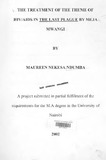| dc.description.abstract | Underlying the perception of literature as an expression of human experiences is a subtle
acknowledgement of some intricate relationship between reality and fiction. The role of a
literary artist, Lukacs notes, is"to look at stark reality in the face. "(95). Most likely then,
it is for this reason that Onoge argues that artistic expressions are "the products of social
praxis"( qtd in Gugelberger22).
This study operates on the conviction that in The Last Plague, Meja Mwangi strives to
balance the demands of the literary art, social reality and moral purpose. The study--"The
treatment 'of the theme of HIV/AIDS in Meja Mwangi's The Last Plague''--set out to
look at the socio-economic impact of HIVIAIDS and how the scourge impacts differently
on men and women. First, it situates Mwangi within the general literary mould as a
committed writer capturing the plight of the lowly. It then proceeds to focus on The Last
Plague and examine the literary artist's rendition of the objective reality that HIV/AIDS
is.
Using the sociological approach to literary criticism as the dominant theoretical
framework, the study reveals the societal misconceptions about the scourge that underlie
its spread. It also shows how culture and ignorance, among other factors undermine
individual as well as collective efforts aimed at combating the scourge.
The study therefore delineates Mwangi's moral values in the text especially in relation to
the gender dynamics in society. It especially focuses on how the scourge ravages the
society socially, economically and psychologically. We discern, for instance, that this
disease severs the cultural web that had hitherto bound this society. Janet's efforts
emerge from the text as the unequivocal acceptance of a cause. We establish, however,
that culturally entrenched view coupled with ignorance make hers a daunting task. The
resolve with which she accomplishes this gigantic task is weighed against the depiction
of her male counterparts'.
The study therefore discerns Mwangi's moral values as they are brought out in the text
and extols Janet's heroism in the face of myriad obstacles. This study is no way
exhaustive. Rather, it is aimed at exciting further critical excavation on the novel
especially its stylistic correspondences: the subtle devices like symbolism, description
and dialogue and how these engender the artist's perceptions into the readers' psyche. | en |

